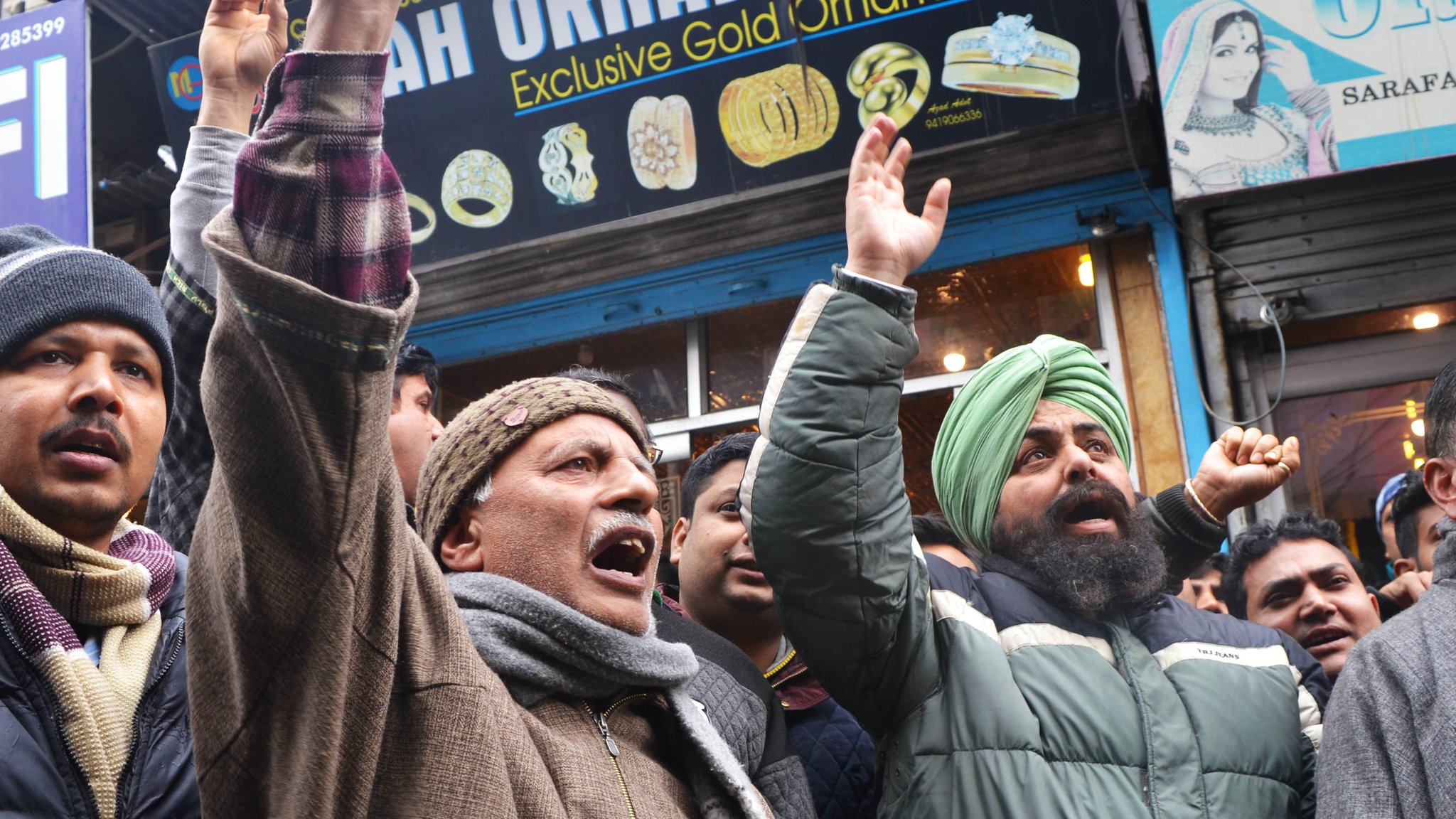INSUBCONTINENT EXCLUSIVE:
Image copyrightGetty ImagesImage caption
Protests have been held in Indian-administered Kashmir over attacks on
Kashmiris in other parts of India
India's top court has ordered the government to protect Kashmiri people from attacks in
apparent retaliation for last week's deadly bombing in Indian-administered Kashmir.There have been several reports of Kashmiri students
and businessmen being harassed or beaten up in recent days.The Supreme Court has also sought a response from the states where these alleged
incidents happened.The attack has sparked anger and anti-Pakistan protests across India
The suicide bombing of an Indian security convoy in Pulwama on 14 February was claimed by a Pakistan-based militant group and has led to a
war of words between nuclear-armed India and Pakistan.But in some cases the anger has been directed against Kashmiri people living in other
The attack, which killed more than 40 Indian paramilitary police, was the deadliest against Indian forces in Kashmir in decades.Hundreds of
Kashmiri students, traders and businessmen have returned to Kashmir from various Indian cities out of fear that they could face harassment
or attack.Jibran Nazir Dar, a Kashmiri journalist working for the Times of India newspaper in the western city of Pune told the
TheIndianSubcontinent he had been beaten by a group of men who shouted "go back to Kashmir" on Thursday.Police confirmed they had registered
a case for the attack.Many Indians have expressed sympathy towards the Kashmiri students on social media, with some offering shelter in
their own homes.India has long had a volatile relationship with Muslim-majority Kashmir, where there has been an armed insurgency against
Indian rule since the late 1980s
The region has been a flashpoint between India and Pakistan since independence
Both countries claim all of Kashmir but control only parts of it
They have fought two wars and a limited conflict over the territory.Image copyrightGetty ImagesImage caption
Kashmiri
students living in Dehradun and other cities have returned home since the attack
What did the court sayThe court's
decision singled out the federal government as well as governments in 10 states which are home to a sizeable Kashmiri population
It asked authorities to widely publicise the details of officials who Kashmiris can contact if they face threats or violence
The order was in response to a petition seeking protection for Kashmiris living across India
Tehseen Poonawala, one of the petitioners, told the TheIndianSubcontinent that he was moved to act because he was "disturbed" after reading
reports of Kashmiris being attacked
"It's not about Kashmiris
We cannot be a country that responds with mob violence," he said.What happened to Kashmiri studentsIn the days following the attack,
isolated incidents of students from Kashmir being beaten up or evicted from their accommodation in northern Indian states were reported in
Kashmiri Muslims were warned to stay vigilant and India's Central Reserve Police Force (CRPF) offered help to those in need, but also
Twenty Kashmiri girls in the northern city of Dehradun were forced to lock themselves in their hostel after protesters gathered outside to
demand their eviction, according to the Times of India
Two other colleges in the city issued public statements saying they would not admit Kashmiri students in the next academic year
"We did so to provide protection to the [Kashmiri] students," the college principal, Aslam Siddidqu, told the TheIndianSubcontinent, adding
that he had faced pressure from right-wing groups.Federal education minister Prakash Javadekar has denied that "incidents" have taken place
involving Kashmiri students.But a police official in Dehradun told the TheIndianSubcontinent that 22 students had been arrested for
protesting and demanding that Kashmiri students be expelled from colleges in the city.Image copyrightGetty ImagesImage caption
Markets and businesses were closed to protest against violence
What's the bigger pictureThe attack has raised
tensions between India and Pakistan, which have fought two wars and a limited conflict in the region and are both nuclear powers.India has
accused Pakistani intelligence services of having a hand in the attack, which was claimed by militant group Jaish-e-Mohammad.Pakistan denies
this and has warned that it will retaliate if India takes military action
In his first comments addressing the attack, Prime Minister Imran Khan said India should "stop blaming Pakistan without any proof or
evidence" and urged Indian authorities to share any "actionable intelligence".India has moved to impose trade restrictions on Pakistan
It has also said it will build dams to reduce the flow of water to Pakistan from three rivers in India
Similar plans were announced in 2016, after a deadly militant attack on an Indian base in Kashmir.The tensions between the neighbours may
also have an impact on cricket, a national obsession in both India and Pakistan
Amid outrage over the attack, there have been calls for India to boycott its much anticipated match against Pakistan at the World Cup in
June.Indian cricket administrators say no decision has yet been made.

